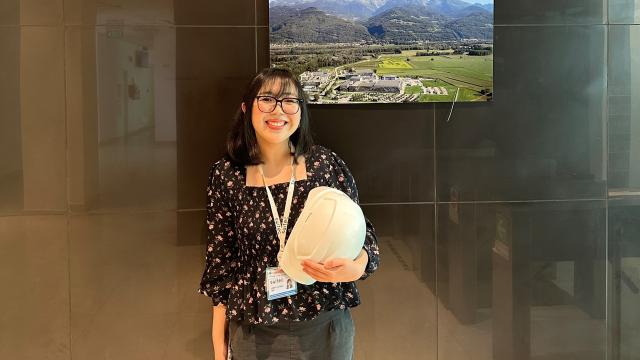 Three SITizens had the opportunity to be part of a waste-to-energy project jointly created by Mursun Pte Ltd and SP Group.
Three SITizens had the opportunity to be part of a waste-to-energy project jointly created by Mursun Pte Ltd and SP Group.
Joel See, a recent graduate of the Mechatronics degree programme offered by University of Glasgow, an overseas university partner of SIT, was joined by two of his juniors to operate and maintain a compact gasification project at Gardens by the Bay. The two were Year Three SITizens, Khor Jia Ming from SIT-Newcastle University (SIT-NU) Electrical Power Engineering programme and Chee Guo Hong from SIT-NU Mechanical Design and Manufacturing Engineering programme. Joel is currently a full-time engineer with Mursun, while Jia Ming and Guo Hong recently concluded their Integrated Work-Study Programme (IWSP) also at Mursun.
 The SITizens posed with SIT staff in front of the Micro Auto Gasification System (MAGS) during a visit to Gardens by the Bay. From left: Mr Tsoi Mun Heng, Vice-President (Planning), Khor Jia Ming, Joel See, Chee Guo Hong and Ms Yeo May-Fung, Director, Centre for Career Readiness.
The SITizens posed with SIT staff in front of the Micro Auto Gasification System (MAGS) during a visit to Gardens by the Bay. From left: Mr Tsoi Mun Heng, Vice-President (Planning), Khor Jia Ming, Joel See, Chee Guo Hong and Ms Yeo May-Fung, Director, Centre for Career Readiness.
For six months, Jia Ming and Guo Hong worked closely with Joel to manage the Micro Auto Gasification System (MAGS) created by Mursun and SP Group. MAGS is a six-metre long enclosed system that converts food waste, plastic and general waste into thermal energy at 650 degrees Celsius. It is currently producing the energy required to heat up a large water tank used by the food and beverage outlets at Supertrees, Gardens by the Bay.
Five percent of the waste's volume becomes biochar – a by-product of carbon-based chips that resemble charcoal, as a result of the chemical reaction in MAGS. As biochar is used to treat the soil at Gardens by the Bay, they are researching biochar's effects on plant growth and health.
Overall, the waste-to-energy project has helped Gardens by the Bay reduce its carbon footprint by up to 20 percent.
The SITizens shared their positive takeaways in operating and maintaining the system.
"Apart from being able to apply the skills I've acquired during the course of my studies, I also got the opportunity to understand Singapore's present waste disposal problems," shared Joel.
"By being immersed in the technology of renewable energy, I've been able to see the bigger picture and come up with possible solutions with my peers to tackle problems that we may encounter," said Jia Ming.
"What we are doing here is a step towards a cleaner and more sustainable environment. Singapore needs a new incineration plant every 10 to 15 years to meet the increasing waste problem. To combat this issue, we need more localised solutions like MAGS and treat waste at its source," reflected Guo Hong.
Indeed, there are exciting times ahead for these three SITizens in their pursuit for a greener Singapore.
![[FA] SIT One SITizen Alumni Initiative_Web banner_1244px x 688px.jpg](/sites/default/files/2024-12/%5BFA%5D%20%20SIT%20One%20SITizen%20Alumni%20Initiative_Web%20banner_1244px%20x%20688px.jpg)


